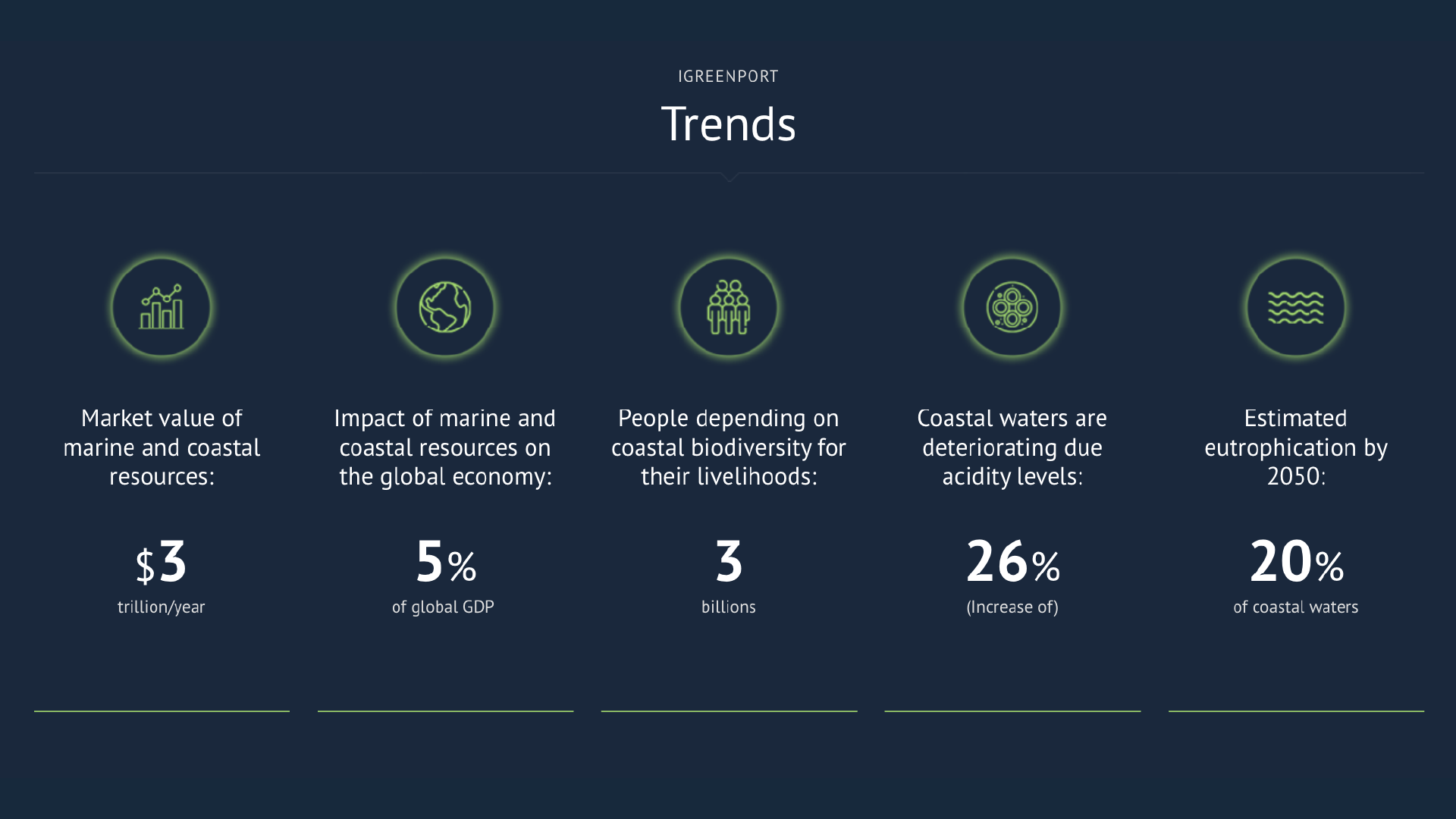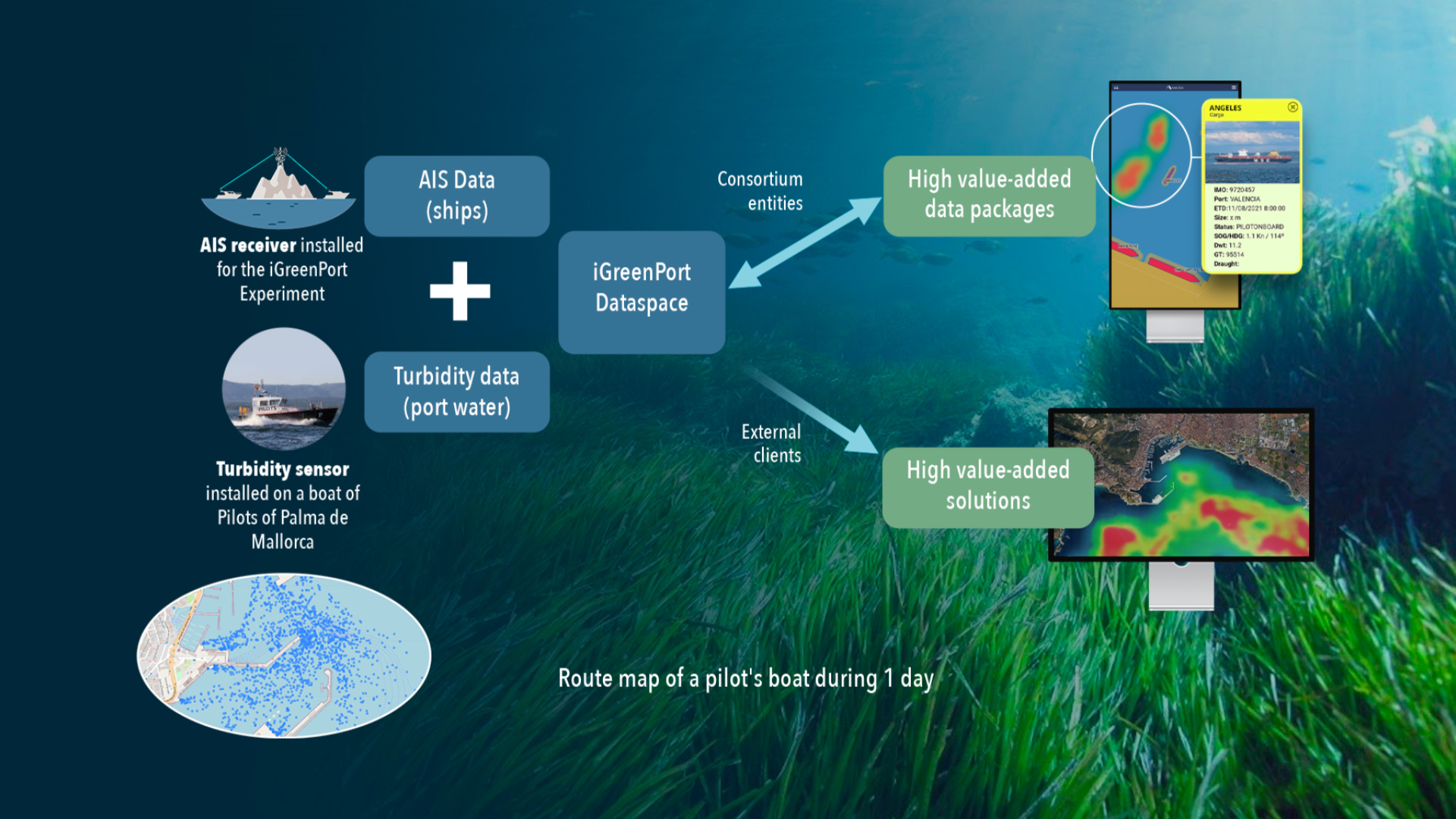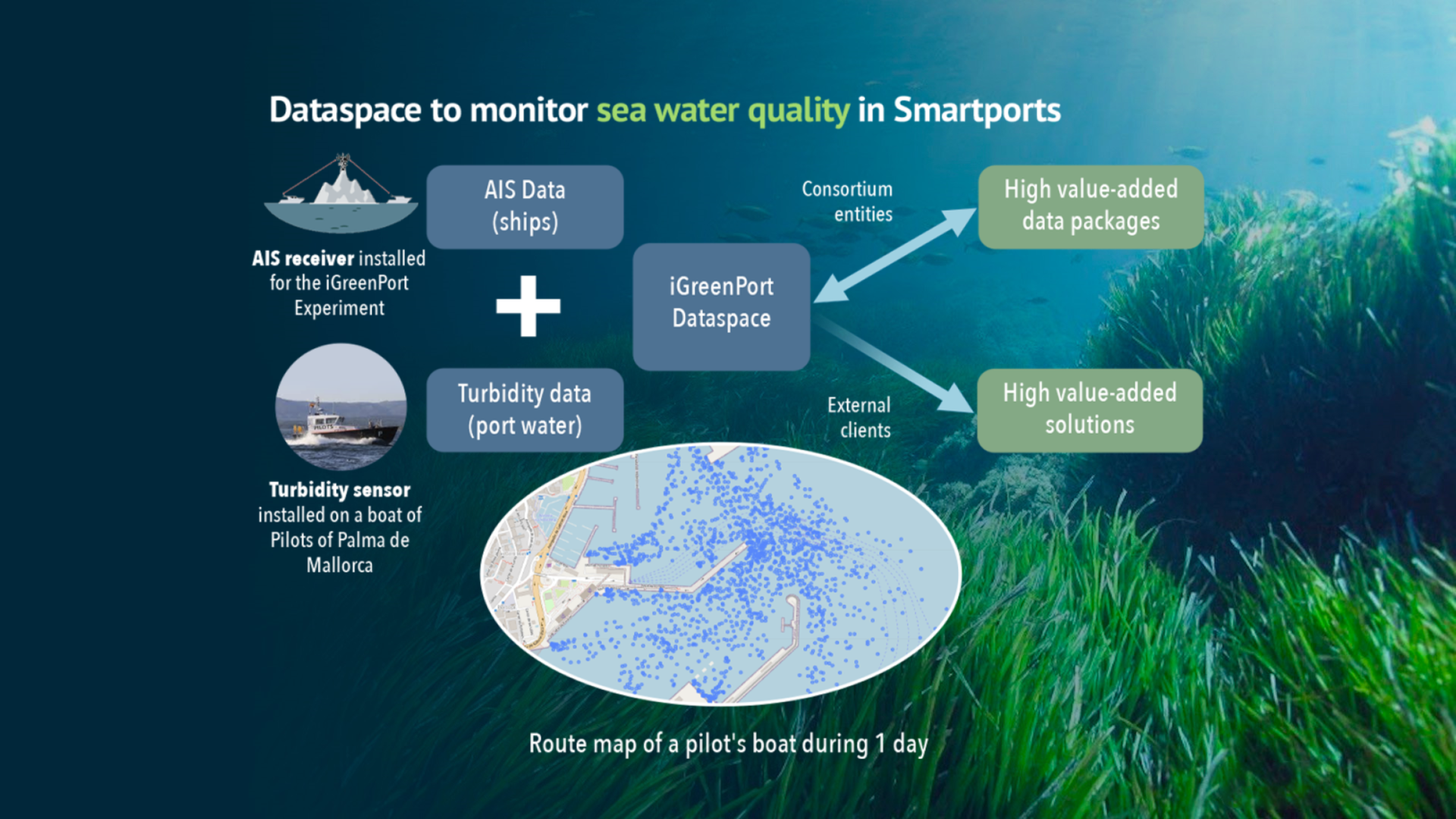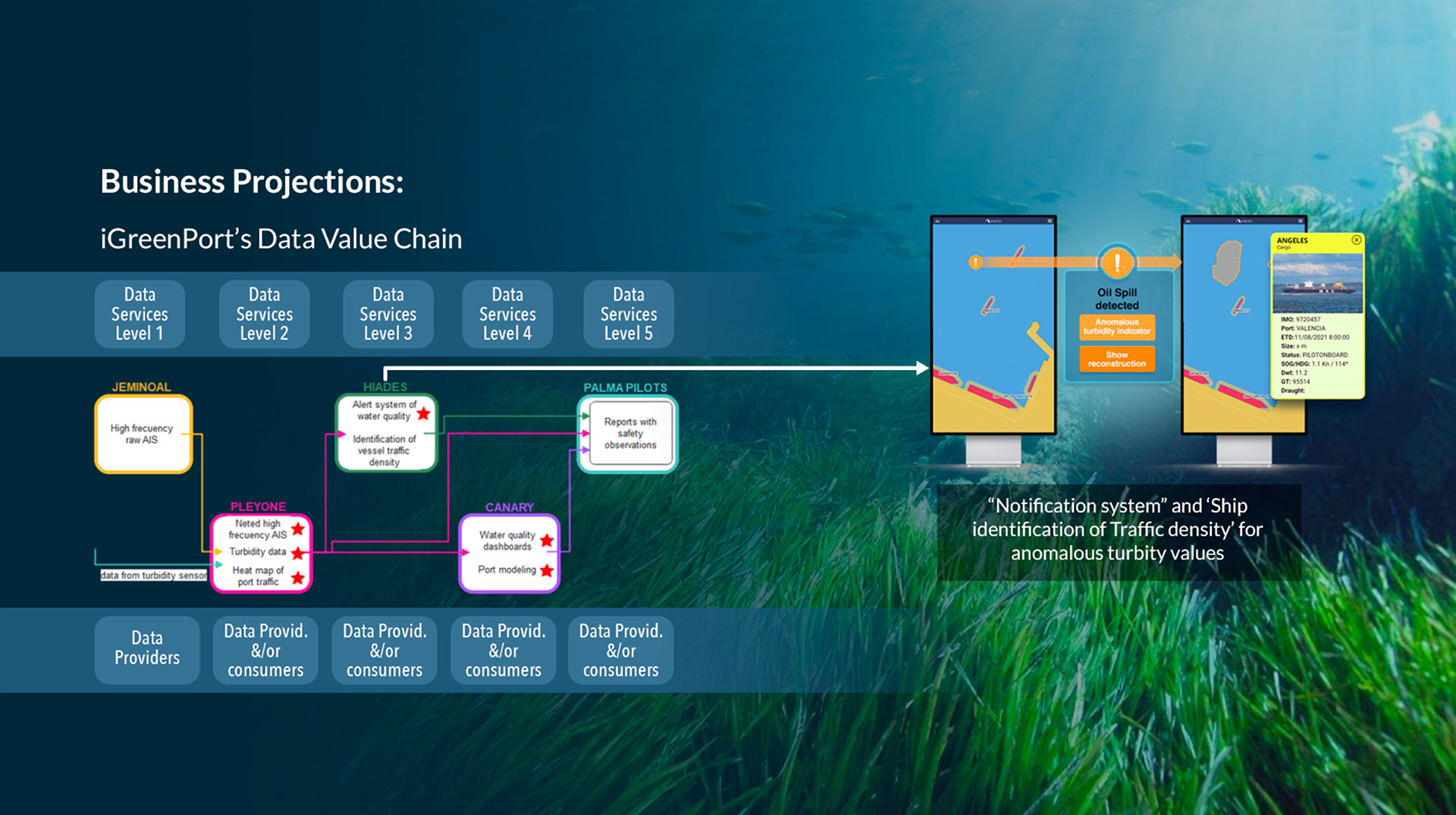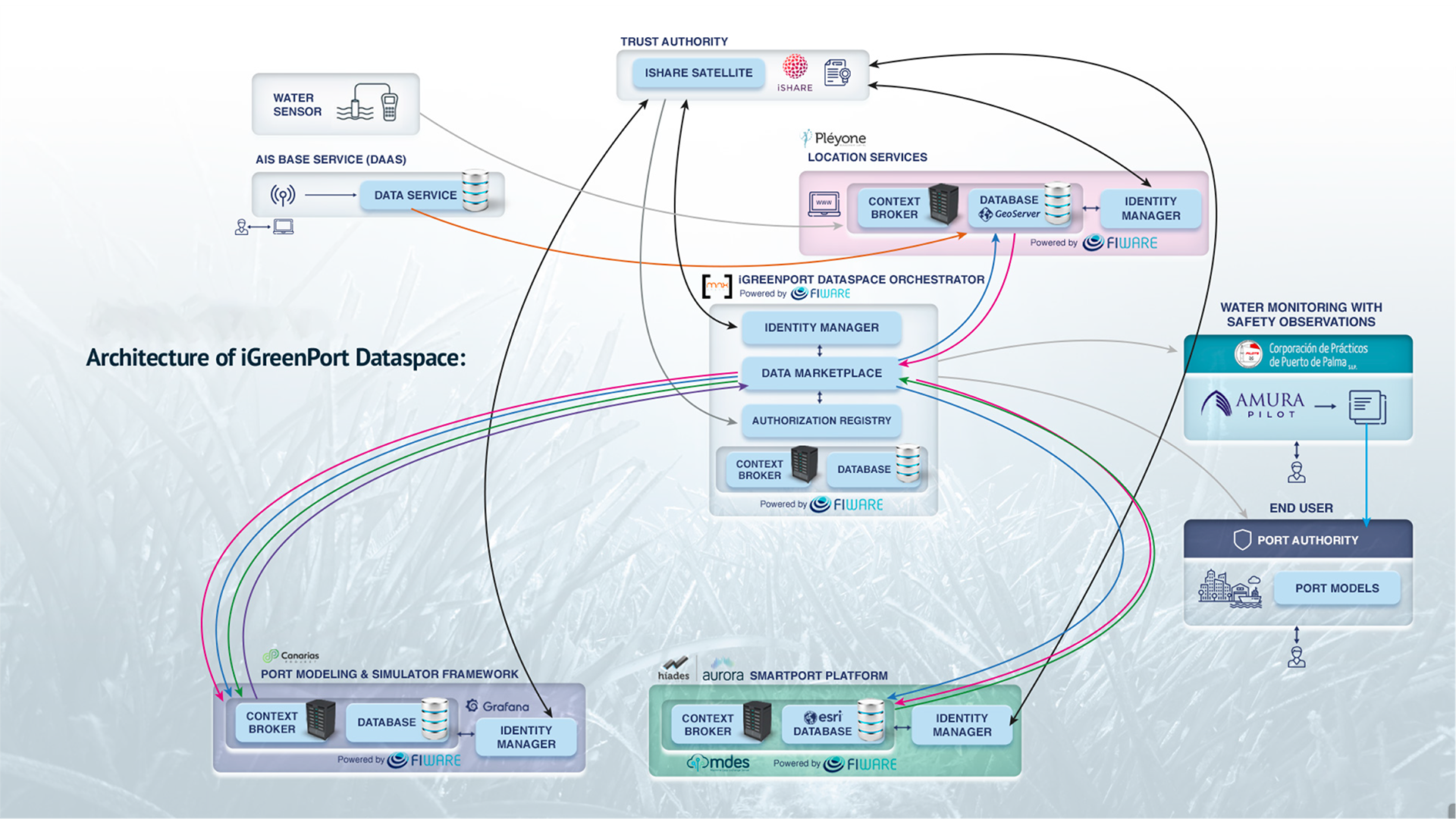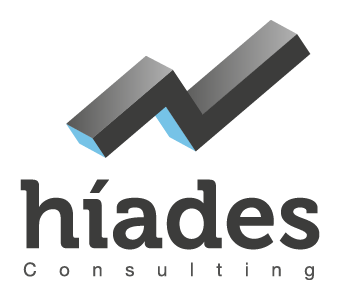Background
Since September 2020, FIWARE Foundation has been leading the successful i4Trust project around Data Spaces, which has been receiving funding by the European Commission under the Grant Agreement of 951975. Thanks to the extraordinary collaboration of partners such as iShare and FundingBox, 32 selected solutions on Data Spaces have been awarded and funded. With the first impacting results available, FIWARE has decided to publish a fine selection of Impact Stories showcasing FIWARE-based solutions created by an awarded and funded consortium of DIHs and SMEs. iGreenPort is a dataspace for sharing and accessing environmental and operational data, such as the seawater quality in the port, in near real-time it is contributing to the European Data Space strategy.
Challenge & Context
Did you know that the world’s largest living organism, measuring 8 km in diameter, is in danger of extinction? This is the Posidonia meadow, a unique Mediterranean plant that can be found in the Balearic Islands under the sea. Posidonia is a treasure for marine biodiversity and is found only in the Mediterranean region.
The Posidonia meadows in the Balearic Islands are a World Heritage Site for good reason. These plants contribute to the oxygenation of the water, and provide a refuge and food source for fish, molluscs, and crustaceans. Additionally, Posidonia helps to reduce the intensity of waves on beaches, thus preventing sand loss.
Figure 1 . Global socio-economic context of iGreenPort
The port of Palma de Mallorca identified a need for iGreenPort, a program to support the digitization of seawater quality control. The Port Authority of the Balearic Islands seeks the help of the port’s maritime pilots to address the issue of water pollution caused mainly by maritime traffic such as ship anchoring and the discharge of poorly treated water, which has a high impact on Posidonia.
So far the environmental perspective has been mostly overlooked in the digital transformation of ports. Currently, real-time data on seawater quality in all port maritime areas does not exist, nor is it integrated with Automatic Identification System (AIS) data, which is transmitted every 3 to 6 seconds by all ships at sea, providing information on their characteristics and position. The combination of seawater quality data with AIS data is crucial for identifying the ships that could cause water pollution.
Having a single platform that integrates these two datasets (water quality and AIS data) would be highly valuable to port authorities, enabling them to monitor seawater in near real time. This “data space platform” would contribute to the PortCDM (Collaborative Decision Making) model, which is being adopted by the most digitally advanced ports. This model facilitates information sharing between all stakeholders in real-time, without paper and with fewer radio calls.
Regarding seawater monitoring, it is important to note that:
- globally, the market value of marine and coastal resources is estimated at 3 trillion dollars per year or about 5% of global GDP. Additionally, over 3 billion people depend on marine and coastal biodiversity for their livelihoods;
- The acidity of the seas has increased by 26% since the beginning of the Industrial Revolution and coastal waters are deteriorating due to pollution and eutrophication. This is expected to increase by 20% by 2050;
European Sea Ports Organization’s SDG 14 Environmental Code of Conduct, instructs port administrations to develop tools to manage environmental problems.
Solution
iGreenPort is a cutting-edge initiative that provides port authorities and other port agents with environmental management capabilities. It offers a dataspace for sharing and accessing environmental and operational data, such as the seawater quality in the port, in near real-time. This enables the authorities to make faster and more informed decisions that promote the efficiency and environmental sustainability of their ports.
Figure 2 . Route map of a pilot’s boat during 1 day
The first phase of the iGreenPort experiment focuses on creating a data marketplace with two types of data collected in near real-time in the Port of Palma de Mallorca (Balearic Islands):
- Seawater quality data, starting with turbidity which is among the 15 indicators mandatory by law;
- AIS data from ships, which provides information about the vessels every 3-6 seconds, including their characteristics and position.This data can be crossed-referenced with the seawater quality data to determine their involvement in contaminated areas.
Real-time AIS data is received directly through a hardware receiver or through integration with port AIS stations.
Turbidity data is collected by a sensor installed on a boat belonging to the maritime pilots of the Port of Palma de Mallorca. These boats are ideal for this purpose as they are in constant movement throughout the day, and can provide a comprehensive and frequent survey of all areas of the port.
Figure 3 . iGreenPort Dataspace
These datasets will be shared through a marketplace with the members of the iGreenPort consortium, who will use them and add value, thus creating new data packages and advanced services related to seawater monitoring and analysis. These services will be available to both consortium members and external clients like port authorities.
The iGreenPort consortium is a group of Spanish companies with highly specialized personnel in all areas relevant to the project. The consortium includes experts in business consulting for the port sector, specialists in Smart Cities platforms, particularly in FIWARE and the i4Trust standard, as well as developers with expertise in Artificial Intelligence, Internet of Things, sensors, and data exchange platform development.
With the exception of the Pilot Corporation of Palma de Mallorca (Balearic Islands), all of the companies in the consortium are based in the Canary Islands:
- HIADES Business Patterns SL is the leader of the project. It is a software provider specialized in the digitization of nautical services, with its AMURA product line deployed in over 20 international ports. HIADES has business specialists, analyst programmers, and system integration experts specialized in the Port sector;
- CIDIHUB, the Canary Islands Digital Innovation Hub, provides support for coordination and results dissemination;
- MNX Online is an IT consulting and software development company with a certified FIWARE Expert and i4Trust Local Expert in B2B Data. MNX is the coordinator of iGreenPort Orchestrator;
- PALMA PILOTs is a corporation of maritime pilots in the Port of Palma de Mallorca (Balearic Islands). It is a data consumer of the Marketplace which, with its own quality certification system, will offer a highly improved service to the Baleares Port Authority;
- PLEYONE Management Capital SL is a provider of advanced IT solutions, with a focus on the port and maritime sector. Their team of experts specializes in IT, IoT, and GIS systems;
- CANARY Islands Connection SL is a provider of data analysis services, specializing in AI models;
- JEMINOAL FARMAGROUP SL is a provider of machinery, equipment, and supplies.
The iGreenPort Data Value Chain, where each level is occupied by a member of the iGreenPort consortium, acts as either a data provider, or a data consumer in the marketplace, or both. Data flows from left to right , from data providers to data consumers, who use the shared datasets to create innovative products and services.
Figure 3 . iGreenPort’s Data Value Chain
In iGreenPort’s Data Value Chain, JEMINOAL is a level 1 data provider, since it provides the AIS raw data at high frequencies. Meanwhile, HIADES, PLEYONE, and CANARY are all data consumers and data providers, creating new data packages or data services shared through the i4Trust Marketplace:
- At level 2, PLEYONE provides data packages of processed AIS data, and a seawater quality heat map of the port, which visualizes the turbidity and ship traffic of different areas in real-time.
- At level 3, HIADES provides identification of vessel traffic density, a reconstruction of port status and vessel information in case of turbidity anomalies, and a notification system for anomalous indicators to the relevant authority.
- At level 4, CANARY creates real-time dashboards and port characterization models based on water quality historical data.
In summary, the iGreenPort Marketplace, will make available high-value data package services for monitoring and analyzing the seawater quality of ports, such as:
- Heat maps with seawater indicators in all the maritime areas of the port displayed on an interactive monitor
- Alarm system for anomalous seawater indicators
- Reports of vessels that sailed before contamination incidents
- Dashboards with historical data of seawater indicators
- Predictive models of vessels with a higher likelihood of causing pollution incidents.
How it works
The iGreenPort Experiment facilitates data exchange through a FIWARE-powered platform with an i4Trust Marketplace. To develop iGreenPort, a structure based on FIWARE technology is required to support Big Data from IoT in near real-time combined with iShare standards to enable a marketplace with a robust, secure, and agile authentication system.
Figure 5. Architecture of iGreenPort
By following the philosophy of i4Trust and utilizing FIWARE technology and its various components, such as a marketplace, security component, and the storage of large amounts of real-time data, as well as iShare for multinational electronic identification, iGreenPort creates a space where different entities involved in a port can exchange data efficiently, securely, traceably, and automatically. This creates a Data Space, a place where these entities and their systems can exchange information and generate new value, through the aggregated data.
The HIADES, PLEYONE and CANARY entities have FIWARE components, while JEMINOAL and PALMA PILOTs do not require it.
JEMINOAL collects the raw AIS data and sends it to PLEYONE for processing and delivery to the marketplace in response to specific requests. Seawater quality data is also collected through PLEYONE, which receives the data directly from the sensor installed on the pilot boat.
End users such as Port Authorities, can request data/service packages through the Marketplace (as explained in the section “Solution”). Each specific request is validated as a trusted entity and eventually translates into data acquisition requests to each data provider, which is then intercepted by their respective PEPs.
iShare Satellite will enable, in coordination with the identity provider and authorization registry, the validation of trusted organizations sharing data in the iGreenPort Data space.
Benefits & Impact
Port Authorities are responsible for the prevention and control of marine pollution emergencies in their service area (Zone 1) and are investing in specialized surveillance to allow for rapid action in the event of pollution incidents. iGreenPort provides a cutting-edge tool for monitoring seawater quality in near real-time and identifying ships that could cause water pollution.
The results are aimed at Port Authorities, or by delegation, Port Control, coast guards, pilots, and their suppliers, as well as other port agents and research groups in this field.
Under a conservative assumption of reaching 59 ports in 5 years, representing 5.1% of the total addressable market, which is the 1,164 ports in Spain and South/Central America, where HIADES already has commercial networks, and the USA (a market that HIADES is currently entering).
iGreenPort projects more than 6M€ in revenue in the fifth year, with an annual profit increase of over 30% during the following 5 years.
Future plans, in addition to commercial actions, include expanding iGreenPort to a new customer segment such as pollution monitoring on busy beaches.
Added value through FIWARE
In recent years, the port sector has undergone significant changes. Port Authorities have shifted from being solely responsible for managing the port’s territory and assets, to organizing and managing the entire port ecosystem. In this new paradigm, digital data exchange platforms play a crucial role in providing real-time information to all port agents on the operations taking place in the port. This improves situational awareness, enables collaborative decision-making and leads to increased efficiency and safety in maritime-port operations.
HIADES has been utilizing FIWARE applications for 3 years. After consolidating the AMURA Smart Port Ecosystem digitization tools in more than 20 ports globally, HIADES implemented a digital platform in the cloud to exchange all this digitized data, along with data from IoT devices placed in ports and other digital assets. This led to the creation of the AURORA SmartPorts Platform, a state-of-the-art product powered by FIWARE, that brings best practices from the use of FIWARE in SmartCities to the port sector. AURORA provides the opportunity to collect data from different sources and compile it into a single platform to apply advanced analytics. This enables the creation of real-time monitoring dashboards or predictive models on the port.
HIADES has successfully applied its FIWARE AURORA platform in various projects. These include iGreenPort and AMURA ZIDAY, both of which are focused on real-time monitoring and detection of pollution incidents in port waters, with an identification service for the vessels causing them.
FIWARE technology is ideal for Big Data exchange projects due to its many advantages, including:
- Seamless integration of real-time data and data from different sources.
- Federation of different FIWARE platforms with each other.
- A great supporting community.
Next Steps
The next step for iGreenPort is to enhance its capabilities by integrating it with AMURA Ziday, another project created by HIADES in partnership with Orbital EOS and supported by European funds through the DigiCirc (Blue Economy) Program. AMURA Ziday, based on the same Smart Port platform, powered by FIWARE, offers a digital solution for the early detection of oil spills on the sea surface through satellite observation. By integrating iGreenPort and AMURA Ziday, an even more comprehensive and powerful product will be created.
In addition, HIADES has also designed another project, SmartEDIPort, which aims to create a dataspace for sharing EDI data, used by Port Authorities, terminals, shipping agencies, and other port agents. This project has been presented to the second call of i4Trust.

